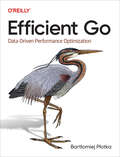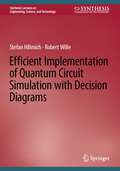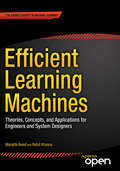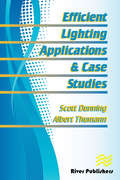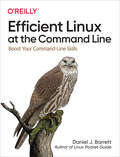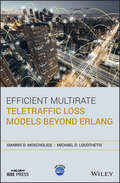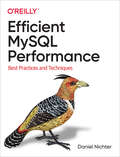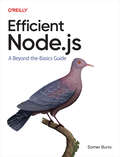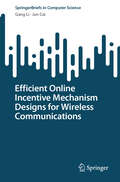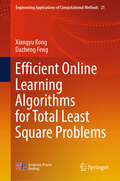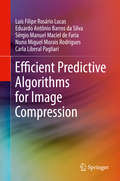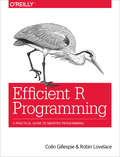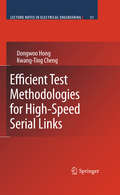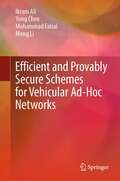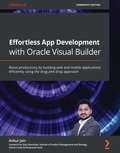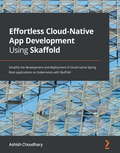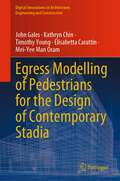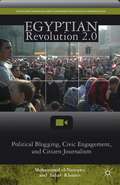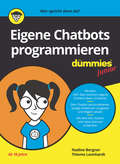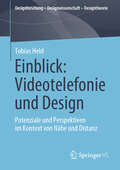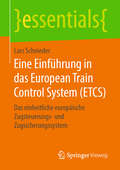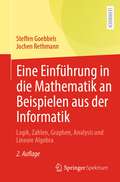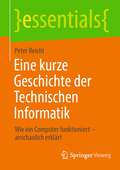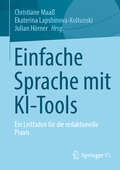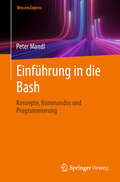- Table View
- List View
Efficient Go: Data-Driven Performance Optimization
by Bartlomiej PlotkaWith technological advancements, fast markets, and higher complexity of systems, software engineers tend to skip the uncomfortable topic of software efficiency. However, tactical, observability-driven performance optimizations are vital for every product to save money and ensure business success. With this book, any engineer can learn how to approach software efficiency effectively, professionally, and without stress. Author Bartłomiej Płotka provides the tools and knowledge required to make your systems faster and less resource-hungry. Efficient Go guides you in achieving better day-to-day efficiency using Go. In addition, most content is language-agnostic, allowing you to bring small but effective habits to your programming or product management cycles. This book shows you how to: Clarify and negotiate efficiency goalsOptimize efficiency on various levelsUse common resources like CPU and memory effectivelyAssess efficiency using observability signals like metrics, logging, tracing, and (continuous) profiling via open source projects like Prometheus, Jaeger, and ParcaApply tools like go test, pprof, benchstat, and k6 to create reliable micro and macro benchmarksEfficiently use Go and its features like slices, generics, goroutines, allocation semantics, garbage collection, and more!
Efficient Implementation of Quantum Circuit Simulation with Decision Diagrams (Synthesis Lectures on Engineering, Science, and Technology)
by Robert Wille Stefan HillmichThis book provides an easy-to-read introduction into quantum computing as well as classical simulation of quantum circuits. The authors showcase the enormous potential that can be unleashed when doing these simulations using decision diagrams—a data structure common in the design automation community but hardly used in quantum computing yet. In fact, the covered algorithms and methods are able to outperform previously proposed solutions on certain use cases and, hence, provide a complementary solution to established approaches. The award-winning methods are implemented and available as open-source under free licenses and can be easily integrated into existing frameworks such as IBM’s Qiskit or Atos’ QLM.
Efficient Learning Machines: Theories, Concepts, and Applications for Engineers and System Designers
by Mariette Awad Rahul KhannaMachine learning techniques provide cost-effective alternatives to traditional methods for extracting underlying relationships between information and data and for predicting future events by processing existing information to train models. Efficient Learning Machines explores the major topics of machine learning, including knowledge discovery, classifications, genetic algorithms, neural networking, kernel methods, and biologically-inspired techniques. Mariette Awad and Rahul Khanna's synthetic approach weaves together the theoretical exposition, design principles, and practical applications of efficient machine learning. Their experiential emphasis, expressed in their close analysis of sample algorithms throughout the book, aims to equip engineers, students of engineering, and system designers to design and create new and more efficient machine learning systems. Readers of Efficient Learning Machines will learn how to recognize and analyze the problems that machine learning technology can solve for them, how to implement and deploy standard solutions to sample problems, and how to design new systems and solutions. Advances in computing performance, storage, memory, unstructured information retrieval, and cloud computing have coevolved with a new generation of machine learning paradigms and big data analytics, which the authors present in the conceptual context of their traditional precursors. Awad and Khanna explore current developments in the deep learning techniques of deep neural networks, hierarchical temporal memory, and cortical algorithms. Nature suggests sophisticated learning techniques that deploy simple rules to generate highly intelligent and organized behaviors with adaptive, evolutionary, and distributed properties. The authors examine the most popular biologically-inspired algorithms, together with a sample application to distributed datacenter management. They also discuss machine learning techniques for addressing problems of multi-objective optimization in which solutions in real-world systems are constrained and evaluated based on how well they perform with respect to multiple objectives in aggregate. Two chapters on support vector machines and their extensions focus on recent improvements to the classification and regression techniques at the core of machine learning.
Efficient Lighting Applications and Case Studies
by Albert Thumann Scott C. DunningWith the increased concern for energy conservation in recent years, much attention has been focused on lighting energy consumption and methods for reducing it. Along with this concern for energy efficient lighting has come the realization that lighting has profound effects on worker productivity as well as important aesthetic qualities. This book presents an introduction to lighting design and energy efficiency which can be utilized while maintaining the quality of illumination. Topics include lighting energy management, selection of lamps, task lighting, lighting design, lighting control, reflectors, ballast selection, natural daylighting, wireless lighting control, and case studies.
Efficient Linux at the Command Line: Boost Your Command-Line Skills
by Daniel J. BarrettTake your Linux skills to the next level! Whether you're a system administrator, software developer, site reliability engineer, or enthusiastic hobbyist, this practical, hands-on book will help you work faster, smarter, and more efficiently. You'll learn how to create and run complex commands that solve real business problems, process and retrieve information, and automate manual tasks.You'll also truly understand what happens behind the shell prompt, so no matter which commands you run, you can be more successful in everyday Linux use and more competitive on the job market.As you build intermediate to advanced command-line skills, you'll learn how to:Choose or construct commands that get your work done quicklyRun commands efficiently and navigate the Linux filesystem with easeBuild powerful, complex commands out of simpler onesTransform text files and query them like databases to achieve business goalsControl Linux point-and-click features from the command line
Efficient Multirate Teletraffic Loss Models Beyond Erlang (Wiley - IEEE)
by Ioannis D. Moscholios Michael D. LogothetisA comprehensive study in efficient multi-rate teletraffic loss models used for designing, performance analysis, and optimization of systems and networks Efficient Multirate Teletraffic Loss Models Beyond Erlang is an easy-to-read book filled with numerous efficient teletraffic loss models. Presented in three sections—Teletraffic Models of Random Input, Teletraffic Models of Quasi-Random Input, and Teletraffic Models of Batched Poisson Input—it covers everything that a professional experienced with optimization and dimensioning of telecom networks could ever need to know. This unique book provides a detailed explanation on how efficient multirate teletraffic loss models are extracted and applied, and guides readers through almost all network technologies and services. Starting from the basics, it steadily increases in difficulty to keep the book self-contained and to provide a better understanding to those who might be new to the subject. It includes detailed explanations of the complex teletraffic models—many of which were developed by the authors. Tutorial examples, several backed by supplementary software, are accompanied by intermediate results and figures. Additionally, end-of-chapter applications describe the applicability of the models to modern network technologies, updating the incorporated teletraffic models of commercial packages/tools. Uses the classic EMLM (Erlang Multirate Loss Model) as its base to present a comprehensive range of teletraffic models through detailed explanation and numerical examples Filled with the authors’ own original teletraffic models—making for a wholly unique learning experience Offers a clear, self-contained presentation with a beginning, middle, and end Starts with simple models, then moves to more complex models, before finishing with complicated ones Supplemented by an accompanying website with computer implementation of the most important models Directed primarily at telecommunication engineers, Efficient Multirate Teletraffic Loss Models Beyond Erlang is also useful for telecom operators or managers on the higher and average levels, as well a Ph.D. students, researchers, and modelers.
Efficient MySQL Performance: Best Practices and Techniques
by Daniel NichterYou'll find several books on basic or advanced MySQL performance, but nothing in between. That's because explaining MySQL performance without addressing its complexity is difficult. This practical book bridges the gap by teaching software engineers mid-level MySQL knowledge beyond the fundamentals, but well shy of deep-level internals required by database administrators (DBAs).Daniel Nichter shows you how to apply the best practices and techniques that directly affect MySQL performance. You'll learn how to improve performance by analyzing query execution, indexing for common SQL clauses and table joins, optimizing data access, and understanding the most important MySQL metrics. You'll also discover how replication, transactions, row locking, and the cloud influenceMySQL performance.Understand why query response time is the North Star of MySQL performanceLearn query metrics in detail, including aggregation, reporting, and analysisSee how to index effectively for common SQL clauses and table joinsExplore the most important server metrics and what they reveal about performanceDive into transactions and row locking to gain deep, actionable insightAchieve remarkable MySQL performance at any scale
Efficient Node.js: A Beyond-the-Basics Guide
by Samer BunaTake your web development skills from browser to server with Node.js, the popular backend framework used by more than 10 million developers at companies like Amazon, Netflix, and LinkedIn, to name just a few. If you're comfortable working with JavaScript, this practical guide from Samer Buna will show you how to effectively build and maintain even the most complex Node.js applications.Following a hands-on, project-based approach, you'll move from key fundamentals to advanced concepts such as modules, packages, event-driven architecture, streams, child processes, scaling, testing, deployment, and much more—all while focusing on what actually matters in practice.Understand Node.js's native capabilities in order to best use the powerful libraries and tools in its ecosystemUtilize Node.js modules and packagesExplore Node.js's event-driven architecture, streams, and child processesCreate, test, and maintain efficient and scalable Node.js applications
Efficient Online Incentive Mechanism Designs for Wireless Communications (SpringerBriefs in Computer Science)
by Gang Li Jun CaiThis book initially delves into its fundamentals to initiate the exploration of online incentive mechanisms in wireless communications. Three case studies are provided to elaborate details on designing online mechanism design in practical system. For crowdsensing with random task arrivals, this book introduces a linear online incentive mechanism model with insurance of the quality of information for each incoming task. In the context of edge computing systems, the authors model a nonlinear online incentive mechanism with the consideration of mobile users’ energy budget constraints. It also explores online incentive mechanism for collaborative task offloading in mobile edge computing to achieve on-arrival instant responses. This book not only disseminates current knowledge but also sheds light on future research directions. The design of incentive mechanisms in wireless communication systems is of paramount importance as it encourages dormant terminals within networks to contribute their valuable resources. The consideration of randomness of network processes enhances the mechanism design under online settings and decision making on the fly. This book endeavours to bridge existing knowledge gaps by comprehensively presenting and developing fundamental insights into online incentive mechanisms and their design methods in the realm of wireless communications. It’s one of the first books to provide a comprehensive understanding of the fundamental principles of online incentive mechanisms and their intricately designed methods in the dynamic world of wireless communications. Future research directions include an investigation in the evolving domain of online incentive mechanism designs within wireless communications. This book strikes a balance between theoretical knowledge and practical application, making it a valuable resource for both researchers and practitioners in the field of wireless communications and network economics. Advanced-level students majoring in computer science and/or electrical engineering will want to purchase this book as a study guide.
Efficient Online Learning Algorithms for Total Least Square Problems (Engineering Applications of Computational Methods #21)
by Xiangyu Kong Dazheng FengThis book reports the developments of the Total Least Square (TLS) algorithms for parameter estimation and adaptive filtering. Specifically, it introduces the authors’ latest achievements in the past 20 years, including the recursive TLS algorithms, the approximate inverse power iteration TLS algorithm, the neural based MCA algorithm, the neural based SVD algorithm, the neural based TLS algorithm, the TLS algorithms under non-Gaussian noises, performance analysis methods of TLS algorithms, etc. In order to faster the understanding and mastering of the new methods provided in this book for readers, before presenting each new method in each chapter, a specialized section is provided to review the closely related several basis models. Throughout the book, large of procedure of new methods are provided, and all new algorithms or methods proposed by us are tested and verified by numerical simulations or actual engineering applications. Readers will find illustrative demonstration examples on a range of industrial processes to study. Readers will find out the present deficiency and recent developments of the TLS parameter estimation fields, and learn from the the authors’ latest achievements or new methods around the practical industrial needs. In my opinion, this book can be assimilated by advanced undergraduates and graduate students, as well as statisticians, because of the new tools in data analysis, applied mathematics experts, because of the novel theories and techniques that we propose, engineers, above all for the applications in control, system identification, computer vision, and signal processing.
Efficient Predictive Algorithms for Image Compression
by Luís Filipe Rosário Lucas Eduardo Antônio Barros da Silva Sérgio Manuel Maciel de Faria Nuno Miguel Morais Rodrigues Carla Liberal PagliariThis book discusses efficient prediction techniques for the current state-of-the-art High Efficiency Video Coding (HEVC) standard, focusing on the compression of a wide range of video signals, such as 3D video, Light Fields and natural images. The authors begin with a review of the state-of-the-art predictive coding methods and compression technologies for both 2D and 3D multimedia contents, which provides a good starting point for new researchers in the field of image and video compression. New prediction techniques that go beyond the standardized compression technologies are then presented and discussed. In the context of 3D video, the authors describe a new predictive algorithm for the compression of depth maps, which combines intra-directional prediction, with flexible block partitioning and linear residue fitting. New approaches are described for the compression of Light Field and still images, which enforce sparsity constraints on linear models. The Locally Linear Embedding-based prediction method is investigated for compression of Light Field images based on the HEVC technology. A new linear prediction method using sparse constraints is also described, enabling improved coding performance of the HEVC standard, particularly for images with complex textures based on repeated structures. Finally, the authors present a new, generalized intra-prediction framework for the HEVC standard, which unifies the directional prediction methods used in the current video compression standards, with linear prediction methods using sparse constraints. Experimental results for the compression of natural images are provided, demonstrating the advantage of the unified prediction framework over the traditional directional prediction modes used in HEVC standard.
Efficient R Programming: A Practical Guide to Smarter Programming
by Colin Gillespie Robin LovelaceThere are many excellent R resources for visualization, data science, and package development. Hundreds of scattered vignettes, web pages, and forums explain how to use R in particular domains. But little has been written on how to simply make R work effectively—until now. This hands-on book teaches novices and experienced R users how to write efficient R code.Drawing on years of experience teaching R courses, authors Colin Gillespie and Robin Lovelace provide practical advice on a range of topics—from optimizing the set-up of RStudio to leveraging C++—that make this book a useful addition to any R user’s bookshelf. Academics, business users, and programmers from a wide range of backgrounds stand to benefit from the guidance in Efficient R Programming.Get advice for setting up an R programming environmentExplore general programming concepts and R coding techniquesUnderstand the ingredients of an efficient R workflowLearn how to efficiently read and write data in RDive into data carpentry—the vital skill for cleaning raw dataOptimize your code with profiling, standard tricks, and other methodsDetermine your hardware capabilities for handling R computationMaximize the benefits of collaborative R programmingAccelerate your transition from R hacker to R programmer
Efficient Test Methodologies for High-Speed Serial Links
by Kwang-Ting Cheng Dongwoo HongEfficient Test Methodologies for High-Speed Serial Links describes in detail several new and promising techniques for cost-effectively testing high-speed interfaces with a high test coverage. One primary focus of Efficient Test Methodologies for High-Speed Serial Links is on efficient testing methods for jitter and bit-error-rate (BER), which are widely used for quantifying the quality of a communication system. Various analysis as well as experimental results are presented to demonstrate the validity of the presented techniques.
Efficient and Provably Secure Schemes for Vehicular Ad-Hoc Networks
by Yong Chen Meng Li Mohammad Faisal Ikram AliThis book focuses on the design of secure and efficient signature and signcryption schemes for vehicular ad-hoc networks (VANETs). We use methods such as public key cryptography (PKI), identity-based cryptography (IDC), and certificateless cryptography (CLC) to design bilinear pairing and elliptic curve cryptography-based signature and signcryption schemes and prove their security in the random oracle model. The signature schemes ensure the authenticity of source and integrity of a safety message. While signcryption schemes ensure authentication and confidentiality of the safety message in a single logical step. To provide readers to study the schemes that securely and efficiently process a message and multiple messages in vehicle to vehicle and vehicle to infrastructure communications is the main benefit of this book. In addition, it can benefit researchers, engineers, and graduate students in the fields of security and privacy of VANETs, Internet of vehicles securty, wireless body area networks security, etc.
Effortless App Development with Oracle Visual Builder: Boost productivity by building web and mobile applications efficiently using the drag-and-drop approach
by Ankur JainBuild web and mobile apps quickly with Oracle Visual Builder and delve into real-time end-to-end use cases, exploring best practices, recommendations, security, and debugging techniquesKey FeaturesExecute various real-time use cases and develop web and mobile applications quicklyEnhance your skills by extending Oracle and non-Oracle SaaS applications using VBGain the knowledge needed to take on projects directly and work independentlyBook DescriptionOrganizations are moving their applications, data, and processes to the cloud to reduce application costs, effort, and maintenance. However, adopting new technology poses challenges for developers, solutions architects, and designers due to a lack of knowledge and appropriate practical training resources. This book helps you get to grips with Oracle Visual Builder (VB) and enables you to quickly develop web and mobile applications and deploy them to production without hassle. This book will provide you with a solid understanding of VB so that you can adopt it at a faster pace and start building applications right away. After working with real-time examples to learn about VB, you'll discover how to design, develop, and deploy web and mobile applications quickly. You'll cover all the VB components in-depth, including web and mobile application development, business objects, and service connections. In order to use all these components, you'll also explore best practices, security, and recommendations, which are well explained within the chapters. Finally, this book will help you gain the knowledge you need to enhance the performance of an application before deploying it to production. By the end of this book, you will be able to work independently and deploy your VB applications efficiently and with confidence.What you will learnGet started with VB and explore its architecture and basic building blocksGain a clear understanding of business objects and learn how to manage themCreate service connections to connect to the external API and Oracle SaaSBuild web and mobile apps and run them on various devicesDevelop Oracle Cloud and non-Oracle SaaS app extensionsGet to grips with data and application security using practical examplesExplore best practices along with troubleshooting and debugging mechanismsConnect your VB application with VBS for application versioning using GitWho this book is forThis book is for IT professionals working with UI technologies to develop web and mobile applications for various industries. Developers and UI designers who want to understand how to use VB, develop scalable web and mobile applications using drag-and-drop features, and design applications in a better way with the help of real-time example apps and code samples will find this book helpful. Prior experience in any UI technology, JavaScript, and REST APIs will be useful.
Effortless Cloud-Native App Development Using Skaffold: Simplify the development and deployment of cloud-native Spring Boot applications on Kubernetes with Skaffold
by Ashish ChoudharyA practical guide to solving inner development loop problems in cloud-native applications by automating build, push, and deploy boilerplate using SkaffoldKey FeaturesLearn how to build and deploy cloud-native applications quickly with KubernetesCreate a production-ready continuous integration and continuous delivery (CI/CD) pipeline for cloud-native appsDiscover ways to create a GitOps-style CD workflow for cloud-native applicationsBook DescriptionKubernetes has become the de facto standard for container orchestration, drastically improving how we deploy and manage cloud-native apps. Although it has simplified the lives of support professionals, we cannot say the same for developers who need to be equipped with better tools to increase productivity. An automated workflow that solves a wide variety of problems that every developer faces can make all the difference!Enter Skaffold – a command-line tool that automates the build, push, and deploy steps for Kubernetes applications.This book is divided into three parts, starting with common challenges encountered by developers in building apps with Kubernetes. The second part covers Skaffold features, its architecture, supported container image builders, and more. In the last part, you'll focus on practical implementation, learning how to deploy Spring Boot apps to cloud platforms such as Google Cloud Platform (GCP) using Skaffold. You'll also create CI/CD pipelines for your cloud-native apps with Skaffold. Although the examples covered in this book are written in Java and Spring Boot, the techniques can be applied to apps built using other technologies too.By the end of this Skaffold book, you'll develop skills that will help accelerate your inner development loop and be able to build and deploy your apps to the Kubernetes cluster with Skaffold.What you will learnOvercome challenges faced while working in an inner development loop using SkaffoldAccelerate your development workflow using SkaffoldUnderstand Skaffold's architecture, internal working, and supported CLI commandsBuild and deploy containers to Kubernetes using the Skaffold CLI and Cloud CodeDeploy Spring Boot applications to fully managed Kubernetes services such as Google Kubernetes Engine using SkaffoldExplore best practices for developing an app with SkaffoldAvoid common pitfalls when developing cloud-native apps with Skaffold in KubernetesWho this book is forCloud-native application developers, software engineers working with Kubernetes, and DevOps professionals who are looking for a solution to simplify and improve their software development life cycle will find this book useful. Beginner-level knowledge of Docker, Kubernetes, and the container ecosystem is required to get started with this book.
Egress Modelling of Pedestrians for the Design of Contemporary Stadia (Digital Innovations in Architecture, Engineering and Construction)
by Timothy Young John Gales Kathryn Chin Elisabetta Carattin Mei-Yee Man OramThis book provides an understanding of people's accessibility needs, and the barriers that may affect people with different identities and circumstances (e.g. different levels of mobility, age, etc.) to alleviate any act of disabling a person and thus offer equal quality of life in the design of stadia. A lack of knowledge exists for stadia concerning demographics, specific accessibility and inclusive design solutions, available movement and behavioural data, and how future growth in attending disabled populations may affect the overall safety of circulation and evacuation in stadia. To address these needs a data collection and modelling were performed and are described in this book. The book recognizes that stadia design is at a revolutionary stage of advancement. Automated data collection technologies and methodologies are described where the authors work towards presentation of big data which can be used for future refinement of modelling technologies and AI routines.
Egyptian Revolution 2.0
by Mohammed El-Nawawy Sahar KhamisThis book sheds light on the growing phenomenon of cyberactivism in the Arab world, with a special focus on the Egyptian political blogosphere and its role in paving the way to democratization and socio-political change in Egypt, which culminated in Egypt's historical popular revolution on Jan. 25, 2011. The authors examine the relevance and applicability of the concepts of citizen journalism and civic engagement to the discourses and deliberations in five of the most popular political blogs in Egypt. They explore the potential connection between virtual activism and real activism in Egyptian political life, as represented in the calls for social, economic and political reform on the streets.
Eigene Chatbots programmieren für Dummies Junior (Für Dummies)
by Nadine Bergner Thiemo LeonhardtIn diesem Buch lernst du Schritt für Schritt, wie du mit dem kostenlosen MIT App Inventor einen Chatbot entwickelst. Du erfährst zuerst, was Chatbots eigentlich sind und dass diese als Alexa, Siri, Bixby, Cortana und Google schon um uns sind. Du gehst der Frage nach, auf welche Weise Chatbots intelligent sind. Die erste Chatbot-App, die du nach Anleitung entwickelst, beantwortet eine einfache Frage von dir. Am Ende erzählt der Chatbot Witze. Weitere Beispiele zeigen dir, was sonst noch alles möglich ist: Der Chatbot wird immer schlauer und geht immer besser auf seinen Chatpartner ein. Bestens geeignet für Kinder und Jugendliche ab 10 Jahren.
Einblick: Potenziale und Perspektiven im Kontext von Nähe und Distanz (Designforschung – Designwissenschaft - Designtheorie)
by Tobias HeldDer Band beschäftigt sich mit der Erforschung sozio-interaktiver Potentiale der Videotelefonie im Kontext von Nähe und Verbundenheit mit Fokus auf dem Eigenbild sowie dem Rederechtswechsel. Die Videotelefonie als Kommunikationsform hat sich – und darauf deuten die Erfahrungen der Covid-19-Pandemie hin – im lebensweltlichen Alltag der Menschen etabliert und wird dort in naher Zukunft nicht mehr wegzudenken sein. Auf Basis ihrer Möglichkeiten und Errungenschaften ist es inzwischen Realität und Lebenswirklichkeit, dass die Kommunikation sowohl im privaten als auch im geschäftlichen Kontext mittels verschiedenster Kanäle stattfindet. Der Videotelefonie kommt hierbei als solche nicht nur eine tragende Funktion, sondern auch eine herausragende Rolle bei der vermeintlichen Reproduktion der Face-to-Face-Kommunikation im digitalen Raum zu und wird wie selbstverständlich zum zwischenmenschlichen Austausch genutzt. Just an diesem Punkt knüpft die Forschungsarbeit an. Zentral stand dabei das Vorhaben einer dezidierte Untersuchung des Forschungsgegenstandes Videotelefonie, sowohl aus Kultur- als auch Technikhistorischer, aber auch Medien-, Wahrnehmungs- wie Kommunikations- theoretischer Perspektive, indem analytische und phänosemiotische Perspektiven miteinander in Beziehung gesetzt werden (z.B. Wahrnehmungsbedingungen, Interaktionsmerkmale, realisierte Kommunikationsprozesse etc.). Die Arbeit ist damit vor allem im Bereich des Produkt- und Interactiondesigns zu verorten, adressiert jedoch auch Motive der Medien- und Wahrnehmungstheorie. Darüber hinaus hat sie das Ziel der Darlegung und Begründung der Videotelefonie als eigenständige Kommunikationsform, welche durch eigene, kommunikative Besonderheiten, die sich in ihrer jeweiligen Ingebrauchnahme sowie durch spezielle Wahrnehmungsbedingungen äußern, und die die Videotelefonie als »Rederechtswechselmedium« avant la lettre konsolidieren, gekennzeichnet ist. Dabei soll der Beweis erbracht werden, dass die Videotelefonie nicht als Schwundstufe einer Kommunikation Face-to-Face, sondern als ein eigenständiges Mediatisierungs- und Kommunikationsereignis zu verstehen sei. Und eben nicht als eine beliebige – sich linear vom Telefon ausgehende – entwickelte Form der audio-visuellen Fernkommunikation darstellt, sondern die gestalterische (Bewegtbild-)Technizität ein eigenständiges Funktionsmaß offeriert, welches wiederum ein innovatives Kommunikationsmilieu im Kontext einer Rederechtswechsel-Medialität stabilisiert.
Eine Einführung in das European Train Control System: Das einheitliche europäische Zugsteuerungs- und Zugsicherungssystem (essentials)
by Lars SchniederDieses Buch behandelt die wichtigsten Aspekte des European Train Control System (ETCS) als Bestandteil des European Rail Traffic Management System (ERTMS). Lars Schnieder führt, ausgehend von den rechtlichen Grundlagen, in die technischen Grundprinzipien von ETCS ein. Der Autor stellt den Aufbau- und die Wirkungsweise der unterschiedlichen Ausrüstungsstufen dar und beschreibt die einzelnen Komponenten der Fahrzeug- und Streckeneinrichtung. Mit den von ETCS unterstützten Betriebsarten wird aufgezeigt, wie ETCS in den verschiedenen Ländern in den Bahnbetrieb integriert werden kann. Durch die Darstellung grundlegender technischer Zusammenhänge und Sicherungsfunktionen wird ein Verständnis für das zukünftige einheitliche Europäische Zugsteuerungs- und Zugsicherungssystem geschaffen.
Eine Einführung in die Mathematik an Beispielen aus der Informatik: Logik, Zahlen, Graphen, Analysis und Lineare Algebra
by Steffen Goebbels Jochen RethmannIm Studienalltag ist oft die Mathematik von den Inhalten der Informatik durch separate Vorlesungen abgegrenzt. Dadurch wird es schwierig einzusehen, warum im Informatik-Studium so viel Mathematik unterrichtet wird. In diesem Buch werden daher Fragestellungen der Informatik in den Mittelpunkt gestellt, für die dann die benötigte Mathematik entwickelt wird.Da das Buch als Einführung geschrieben ist, genügen elementare Schulkenntnisse in Mathematik. Bruchrechnung oder das Umstellen von Gleichungen setzen wir aber als bekannt voraus. Sie sollten auch schon ein wenig programmiert haben, um die (einfachen) Programmbeispiele unmittelbar zu verstehen. Da viele Querbezüge zur Informatik dargestellt werden, eignet sich das Buch insbesondere auch zum Auffrischen der Mathematikkenntnisse - z. B. nach einer Pause zwischen Bachelor- und Master-Studium.Bei der Stoffauswahl haben wir uns an den Kernfächern der Informatik orientiert: Logik und Rechnen mit Bits, Relationen und endliche Automaten, Graphen und Graphenalgorithmen, Zahlen und ihre Darstellung im Computer, Primzahlen und Verschlüsselung, Differenzial- und Integralrechnung in Verbindung mit Aufwandsabschätzungen, Lineare Algebra und Codes.Wir möchten mit dem Buch auch die Grundlage dafür legen, dass Sie sich weitere Themen der Mathematik aneignen können, wenn Sie diese bei der Anwendung der Informatik für andere Disziplinen benötigen.Die zweite Auflage ist um Lösungen der Aufgaben ergänzt und enthält weitere Inhalte wie Nullstellenberechnung und beschreibende Statistik mit Beispielen aus der Informatik.
Eine kurze Geschichte der Technischen Informatik: Wie ein Computer funktioniert – anschaulich erklärt (essentials)
by Peter ReichlHeutige Computer stellen technische Meisterwerke dar. Doch wie ist es eigentlich möglich, dass ein Stück Silizium zusammen mit ein bisschen Strom ganz alleine Berechnungen ausführt und logische Entscheidungen trifft? Die Antwort auf diese Frage führt uns auf eine faszinierende Reise zu den Grundlagen der binären Arithmetik, Booleschen Algebra und Halbleitertechnologie. Im zweiten Teil spielen wir Lego für Fortgeschrittene und bauen aus einfachen Transistoren nach und nach immer komplexere Schaltungen und schließlich ganze Computer zusammen. Dabei konzentrieren wir uns auf das Wesentliche, setzen nichts voraus und lassen überflüssige Details weg. Ein knapper Ausblick auf das Quantencomputing beschließt diese kurze Geschichte der Technischen Informatik.
Einfache Sprache mit KI-Tools: Ein Leitfaden für die redaktionelle Praxis
by Christiane Maaß Ekaterina Lapshinova-Koltunski Julian HörnerDieser Leitfaden erschließt das Potenzial von KI für verständliche Texte. Er basiert auf den Ergebnissen einer Forschungskooperation zwischen dem Wort & Bild Verlag, der Forschungsstelle Leichte Sprache der Uni Hildesheim und dem KI-Unternehmen SUMM AI. Besonders Profis aus dem Bereich Journalismus, Texterstellung und Übersetzung finden hier Orientierung und konkrete Anleitungen, wie sie KI effizient in ihre redaktionellen Abläufe integrieren können.
Einführung in die Bash: Konzepte, Kommandos und Programmierung
by Peter MandlDas Buch vermittelt praktisch verwertbare Shell-Kenntnisse mit einem Fokus auf Bash unter Linux. Neben den grundlegenden Konzepten werden die wichtigsten Bash-Kommandos für die Dateibearbeitung, die Vergabe von Rechten und die Prozessverwaltung knapp und prägnant erläutert. Die Kommandos werden mit vielen Übungen praktisch erprobt. Erste Shell-Programme können nach kurzer Zeit eigenständig entwickelt werden. Die Produktfamilie WissensExpress bietet Ihnen Lehr- und Lernbücher in kompakter Form. Die Bücher liefern schnell und verständlich fundiertes Wissen.
